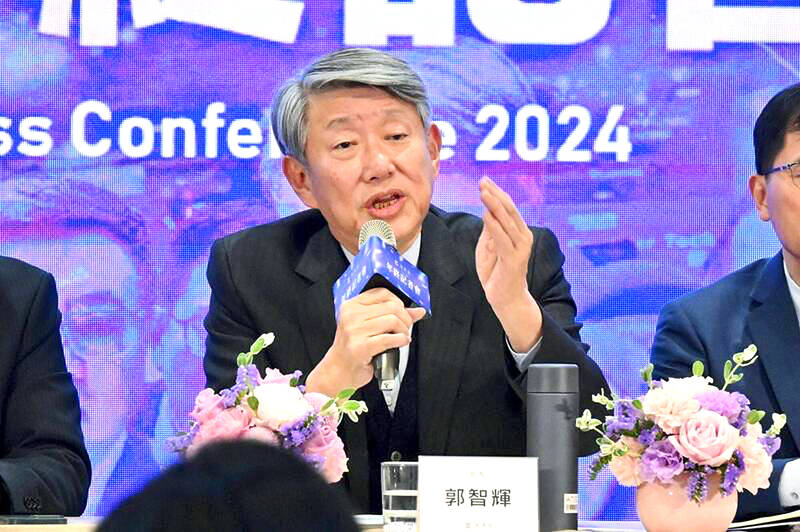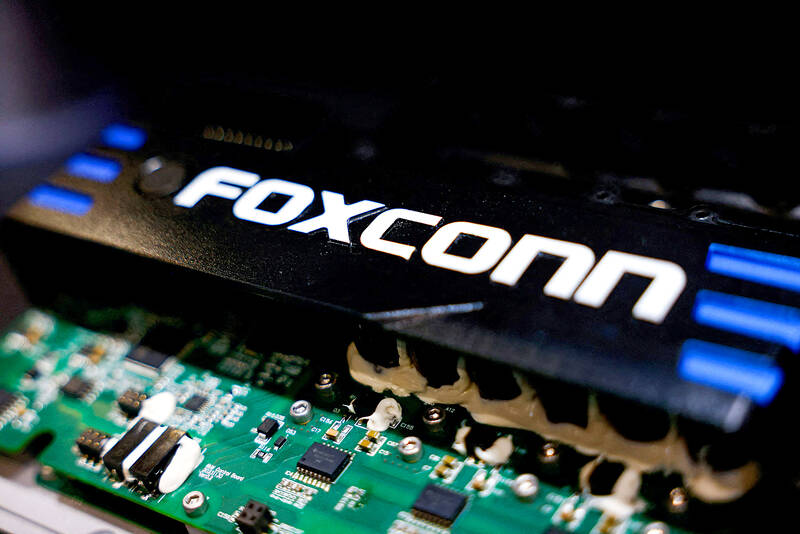The government pledged to help companies with operations in Mexico, such as iPhone assembler Hon Hai Precision Industry Co (鴻海精密), also known as Foxconn Technology Group (富士康科技集團), shift production lines and investment if needed to deal with higher US tariffs.
The Ministry of Economic Affairs yesterday announced measures to help local firms cope with the US tariff increases on Canada, Mexico, China and other potential areas.
The ministry said that it would establish an investment and trade service center in the US to help Taiwanese firms assess the investment environment in different US states, plan supply chain relocation strategies and connect with local partners.

Photo: Liao Chia-ning, Taipei Times
It said it would provide information and insights on target markets for Taiwanese companies that are mulling setting up factories in the US or relocating to Southeast Asia or India.
Additionally, the ministry said it would help businesses shift their attention to local demand, and provide legal guidance and assistance in finding local partners.
The ministry in a statement released on Sunday said that it would help firms deal with potential supply disruptions, after US President Donald Trump signed orders imposing tariffs of 25 percent on imports from neighboring Canada and Mexico.

Photo: Ann Wang, Reuters
Taiwanese firms such as Hon Hai are integrated into the global electronics production chain by assembling servers and gadgets for most of the world’s biggest tech companies. Many Taiwanese companies also manufacture artificial intelligence (AI) servers or make parts for those devices in Mexico to be closer to the US market.
Foxconn last year said it was building the world’s largest assembly site for servers powered by Nvidia Corp’s GB200 chips in Mexico.
Other Taiwanese partners of Nvidia include Inventec Corp (英業達), which also operates plants in Mexico.
Foxconn shares fell 9.2 percent in Taipei, while Inventec shares slumped 8.5 percent — their biggest daily decline since August last year.
“We might organize delegations to attend SelectUSA events and help Taiwanese companies secure support from the local government when they increase their investments in the US to create a win-win business model for US and Taiwanese supply chains,” the ministry said in a texted statement late on Sunday.
Taiwan’s investments in Mexico would have reached US$4 billion by the end of this year, according to the Taipei Economic and Cultural Office in Mexico.
Taiwanese companies have employed about 70,000 people in the country since 1999.
After Trump’s election in November last year, Foxconn and Taiwanese peer Quanta Computer Inc (廣達電腦) increased their investments in the US. Foxconn has secured land in California, Wisconsin and Texas, while Quanta’s board approved a US$230 million capital increase for its US unit.
More than 300 Taiwanese companies have factories in Mexico, government data show.
Additional reporting by Crystal Hsu

Shares in Taiwan closed at a new high yesterday, the first trading day of the new year, as contract chipmaker Taiwan Semiconductor Manufacturing Co (TSMC, 台積電) continued to break records amid an artificial intelligence (AI) boom, dealers said. The TAIEX closed up 386.21 points, or 1.33 percent, at 29,349.81, with turnover totaling NT$648.844 billion (US$20.65 billion). “Judging from a stronger Taiwan dollar against the US dollar, I think foreign institutional investors returned from the holidays and brought funds into the local market,” Concord Securities Co (康和證券) analyst Kerry Huang (黃志祺) said. “Foreign investors just rebuilt their positions with TSMC as their top target,

REVENUE PERFORMANCE: Cloud and network products, and electronic components saw strong increases, while smart consumer electronics and computing products fell Hon Hai Precision Industry Co (鴻海精密) yesterday posted 26.51 percent quarterly growth in revenue for last quarter to NT$2.6 trillion (US$82.44 billion), the strongest on record for the period and above expectations, but the company forecast a slight revenue dip this quarter due to seasonal factors. On an annual basis, revenue last quarter grew 22.07 percent, the company said. Analysts on average estimated about NT$2.4 trillion increase. Hon Hai, which assembles servers for Nvidia Corp and iPhones for Apple Inc, is expanding its capacity in the US, adding artificial intelligence (AI) server production in Wisconsin and Texas, where it operates established campuses. This

Nvidia Corp chief executive officer Jensen Huang (黃仁勳) on Monday introduced the company’s latest supercomputer platform, featuring six new chips made by Taiwan Semiconductor Manufacturing Co (TSMC, 台積電), saying that it is now “in full production.” “If Vera Rubin is going to be in time for this year, it must be in production by now, and so, today I can tell you that Vera Rubin is in full production,” Huang said during his keynote speech at CES in Las Vegas. The rollout of six concurrent chips for Vera Rubin — the company’s next-generation artificial intelligence (AI) computing platform — marks a strategic

US President Donald Trump on Friday blocked US photonics firm HieFo Corp’s US$3 million acquisition of assets in New Jersey-based aerospace and defense specialist Emcore Corp, citing national security and China-related concerns. In an order released by the White House, Trump said HieFo was “controlled by a citizen of the People’s Republic of China” and that its 2024 acquisition of Emcore’s businesses led the US president to believe that it might “take action that threatens to impair the national security of the United States.” The order did not name the person or detail Trump’s concerns. “The Transaction is hereby prohibited,”